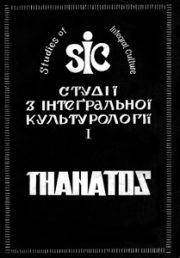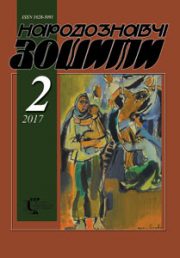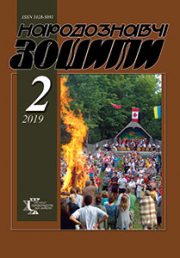The Ethnology Notebooks. 2019, № 4 (148), 823—832
УДК 398.34(=161.2)
DOI https://doi.org/10.15407/nz2019.04.823
LABOR-CENTRIC VALUES IN UKRAINIAN FOLKLORE TRADITION
MUSHKETYK Lesia
ORCID ID: https://orcid.org/0000-0001-5958-0044
Doctor of Phylological Sciences, Corresponding Member
of the National Academy of Sciences of Ukraine
Leading Researcher of the Maxim Rylsky Institute
of Art Studies, Folklore and Ethnology
National Academy of Scienses of Ukraine
Mykilsko-Slobidska str., 2-B, 02002, Kyiv, Ukraine.
Contacts: e-mail: mushketik@ukr.net
Abstract. The article deals with the axiological aspects of labor, that in the traditional Ukrainian society served as the moral of the community, criterion of behavioral rules, family and social significance. The analysis of these questions relies on folk models, versatile ethno-poetic texts that in artistic and poetic form reflect the labor-centric range of values of the peasantry.
Moral and ethical aspects of labor were considered in the writings of the scholars of the past — M. Kostomarov, V. Antonovych, G. Bulashev, P. Zhitetsky, M. Sumtsov, Khr. Yaschurzhynsky and others. Folklore about bondhold, servitude studied M. Drahomanov, I. Franko. Subsequently, these questions were analyzed by M. Gaidai, M. Pasyak, L. Dunaevska, A. Britsina, L. Mushketyk, G. Dovzhenok, I. Hlanta, I. Razumtseva, N. Skrypnyk and others in their studios. In addition to folklorists this topic was interested to ethnologists, philosophers, teachers, and others.
The central category of peasant morality of labor is diligence, with time — efficiency, property appears as accumulated diligence. In the bulk works the principle of mutual aid and charity operates. Mentions of group work and crafts are echoed in folk songs.
The work was primarily a guarantee of the peasant’s existence, therefore, in folklore the land acquires sacredness, a mythical life-giving force in people’s representations, because the cult of land, agricultural labor, as a factor of survival, was the basis of the worldview of a Ukrainian peasant. The components of peasant ideal are also the idea of independence and security, stability, which also provides the land.
The bread echoed a haslo of sacredness in ritual and others folklore. The basic peasant thesis: «Bread — to the whole head», that is, the basis of life, survival, well-being, which is rooted in the ancient agricultural practices of the Slavs. In narratives, signs, paremas, bread appears as a sacred thing, often identified with wealth, goodness, life. Life and rye are matched, merged into beliefs, bread is valued more than gold.
Consequently, labor-centered values in the Ukrainian traditional culture have a moral and ethical content and are a measure of human morality, its social prestige, places in the community, and serve as a means of upbringing a new generation. Their reception is found in various genres of folklore, both prose and song.
At the same time, in folk works condemns forced hard labor, as well as laziness, idleness, which is composed of the impossibility of paramyas.
Keywords: folk culture, morality of labor, folklore, behavioral roles, diligence, earth, bread.
Received 16.05.2019
REFERENCES
Prysyazhnyuk, Yu.L. (2002). Ukrainian peasantry of the XIX—XX centuries: evolution, mentality, traditionalism: tutorial. Cherkasy: Vidlunnya-Plyus [in Ukrainian].
Hayday, M.M. (1972). Folk Ethics in the Folklore of the Eastern and Western Slavs. Kiеv: Scientific Opinion [in Ukrainian].
Kostomarov, N. (1890). Family life in the works of the South Russian folk song creation. In Kostomarov N.Y. Literary heritage. Autobiography of N.I. Kostomarov: Poetry, scenes, historical excerpts, Little Russian folk poetry, last work (Pp. 287—477). SPb. [in Russian].
Antonovych, V., Todyjchuk, O., & Ul’ianovs’kyj, V. (Eds.). (1995). Three national types of folk. In Antonovych V. My confession: Selected historical and journalistic works (Pp. 91—101). Kiеv: Lybid’ [in Ukrainian].
Bulashev, H. (1992). The Ukrainian people in their legends, religious beliefs and beliefs. Kiеv: Trust [in Ukrainian].
Zhytetskyy, P. (1892). Little Russian verses of moral content. Kiev antiquity, 3, 388—408; 4, 37—58 ; 5, 157—175 [in Ukrainian].
Petrov, V. (1928). New Ukrainian variants of the legend about the origin of evil women. Ethnographic herald (Book 6, pp. 55—66). Kiеv [in Ukrainian].
Sukovata, V. (2004). Satirical images of women in fairy-tale folklore: gender aspect. Ethnographic Studios, 5—6, 763—768 [in Ukrainian].
Yashchurzhynskiy, Xr. (1893). Cult of bread in Little Russian carols. Kyevskaia staryna, 12, 408—416 [in Ukrainian].
Sumtsov, N.F. (1885). Bread in ceremonies and songs. Kharkiv [in Ukrainian].
Drahomanov, M. (1918). New Ukrainian songs about public affairs (1764—1880). Kiеv: Krynytsya [in Ukrainian].
Franko, I. (1955). Female bondage Rus folk songs. In Franko I. Selected articles about folk art (Pp. 107—142). Kiеv: Vyd-vo AN URSR [in Ukrainian].
Pazyak, M.M. (1984). Ukrainian proverbs: problems of paremia and paremigraphy. Kiеv: Scientific Opinion [in Ukrainian].
Dunayevs’ka, L.F. (1997). Ukrainian folk prose (legend, fairy tale): the evolution of epic traditions. Kiеv: KNU [in Ukrainian].
Mushketyk, L.H. (2010). A man in the folk tale of the Ukrainian Carpathians: on the material of the Ukrainian and Hungarian narrative tradition. Kiеv: DSH [in Ukrainian].
Mushketyk, L. (2014). Characters of Ukrainian folk tales. Kiеv: Ukrainian writer [in Ukrainian].
Khlanta, Y.V. (1976). Ukrainian social and household fairy tale: dissertation abstract. Kiеv [in Ukrainian].
Britsyna, O.Yu. (1989). Ukrainian folk social and everyday fairy tale (specifics and habits). Kiеv: Scientific Opinion [in Ukrainian].
Dovzhenok, H.V., & Dej, O. (Eds.). (1986). Children’s folklore. Kiеv: Dnipro [in Ukrainian].
Razumtseva, H.I. (2004). Moral-ethical views of the Ukrainian people by folklore sources: dissertation abstract. Kiеv [in Ukrainian].
Skrypnyk, N.I. (2014). Verbalization of the concepts of folk morality in Ukrainian folklore: dissertation abstract. Ivano-Frankivs’k [in Ukrainian].
Bordyuhova, T.H. (2008). Moral value of labor: dissertation abstract. Kharkiv [in Ukrainian].
Mosiyashenko V.A. (2005). Ukrainian ethnopedagogy: teaching. manual. Sumy: University book [in Ukrainian].
Boltarovych, Z. (1993). Traditions of family upbringing. Folk art and ethnography, 2, 16—24 [in Ukrainian].
Sukhomlyns’kyy, V.O. (1976). I give my heart to children. In Sukhomlyns’kyy V.O. Selected Works: in 5 vol. (Vol. 3). Kiеv: Soviet school [in Ukrainian].
Komens’kyy, Ya. (1940). Selected pedagogical works (Vol. I). Great didactics. Kiеv: Soviet school [in Ukrainian].
Ukrainian past: an illustrated ethnographic guide. (1993). Kiеv: Lybid’ [in Ukrainian].
Horbolis, L.M. (2004). The paradigm of people’s religious morality in the writings of Ukrainian writers at the end of the XIX th. — beg. XX century. Sumy: Kozats’kyy val [in Ukrainian].
Khramova, V. (Ed.). (1992). Ukrainian soul. Kyiv: Feniks [in Ukrainian].
Franko, I. (1980). The power of the earth in a modern novel. In I. Franko. Collection of Works: in 50 vol. (Vol. 28, pp. 176—195). Kyiv [in Ukrainian].
Myrnyy, P. (1946). Whether roaring the will as a meal full. In Panas Myrnyy. Vybrani tvory (Vol. 1). Kiеv: State Publishing House of Literature [in Ukrainian].
Golovatsky, J.F. (Ed.). (1878). Folk songs of Galician and Hungarian Rus (Vol. I—III). Moskow: University typography [in Russian].
Khlanta, I. (Ed.). (1994). Fairy tales about the poor and the rich: Ukrainian folk social and everyday fairy tales. Uzhhorod: Patent [in Ukrainian].
Kyrchiv, R. (1991). Peredmova. Kolyadky i shchedrivky (Pp. 5—51). Kiеv: Musical Ukraine [in Ukrainian].
Chebaniuk, O. (Ed.). (1987). Calendar ritual song. Kiеv [in Ukrainian].
Lintur, P.V. (Ed.). (1968). Three golden words: Transcarpathian tales of Vasyl Korolovich. Uzhhorod: Karpaty [in Ukrainian].
Pushik, S. (1995). Tales of the mountains and Pidgirie. Kiеv: Veselka [in Ukrainian].






